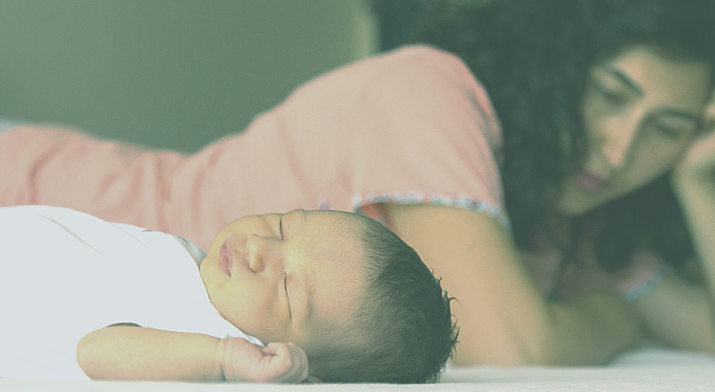Maternal Mental Health: How COVID-19 Has Isolated New and Expecting Moms
By: Laurie Clark
May 4, 2021
Home » Crouse Connects » Maternal Mental Health: How COVID-19 Has Isolated New and Expecting Moms
 The COVID-19 pandemic has been very isolating for many people, especially those who have mental health conditions. In fact, in a May 2020 article for the Washington Post, William Wan wrote that the pandemic is “pushing America into a mental health crisis.”
The COVID-19 pandemic has been very isolating for many people, especially those who have mental health conditions. In fact, in a May 2020 article for the Washington Post, William Wan wrote that the pandemic is “pushing America into a mental health crisis.”
A June 2020 study from the CDC reported that “symptoms of anxiety disorder and depressive disorder increased considerably in the United States during April to June of 2020, compared with the same period in 2019.”
According to Christine Kowaleski, DNP, MHNP-BC, who leads the Crouse Perinatal Family Support Program, expecting and new moms going to medical appointments alone before the baby is born and the “loss of the village” as she progresses through pregnancy have greatly affected women’s mental health.
Feelings of Isolation
For many new moms, the feelings of isolation can start with their spouse or significant other being unable to attend doctor visits with them, due to COVID precautions.
“The fathers who used to almost climb inside of the ultrasound screen at the anatomy scan are now, at best, watching on their smartphones outside,” Kowaleski said.
This can cause a level of detachment for the father and a feeling of less support for the mother.
Exciting events such as baby showers have been limited in how many people can attend, or moved to a virtual or ‘drive-by’ format.
Moms seeking a “village” may rely on online communities, including our Perinatal Family Support Group, which currently meets via Zoom.
“We have seen a significant increase in moms joining us early in pregnancy as well as dealing with increased anxiety and depression. Our support group was increased from weekly to twice a week,” says Kathleen Miller-Murphy, director of women’s health integration.
Although the moms in our support group do miss the in-person connections and activities, they appreciate the support and convenience an online group offers.
Missing the ‘Village’
In 2019, Kowaleski penned a CrouseConnects blog about the importance of a “Parenthood Village” and the notion that an entire community of people must interact with children for those children to experience and grow in a safe and healthy environment.
Because of the COVID pandemic, many new moms are fearful to even bring their new baby to well-visits, let alone having friends and family meet their new little one. This is in addition to the stress moms already deal with of being a new parent, sleep deprivation, difficulties with breastfeeding and other challenges they may face.
“Humans need contact with other humans and although thanks to technology we can connect, it isn’t the same, especially for this vulnerable population,” Kowaleski said.
The Struggle for Perfection
Kowaleski has a message for moms living through this pandemic and beyond: no mom is perfect.
“There is a silent competition to be the best mom — the perfect mom — even during a global pandemic. This is an impossible task, particularly since no one has ever been a ‘perfect mom’ nor will there ever be one,” she said.
Anxiety and depression are not abnormal during pregnancy and postpartum, and moms should not feel alone or isolated because these feelings can be alleviated with help.
If you know a mom who is pregnant during this pandemic or who has recently delivered, check in on her. Ask how she is doing and offer support.
Remember that the Crouse Perinatal Family Support Program is here to help, and can offer telehealth services.
Laurie Clark is the Communications and Digital Media Manager at Crouse Health.
Share this
